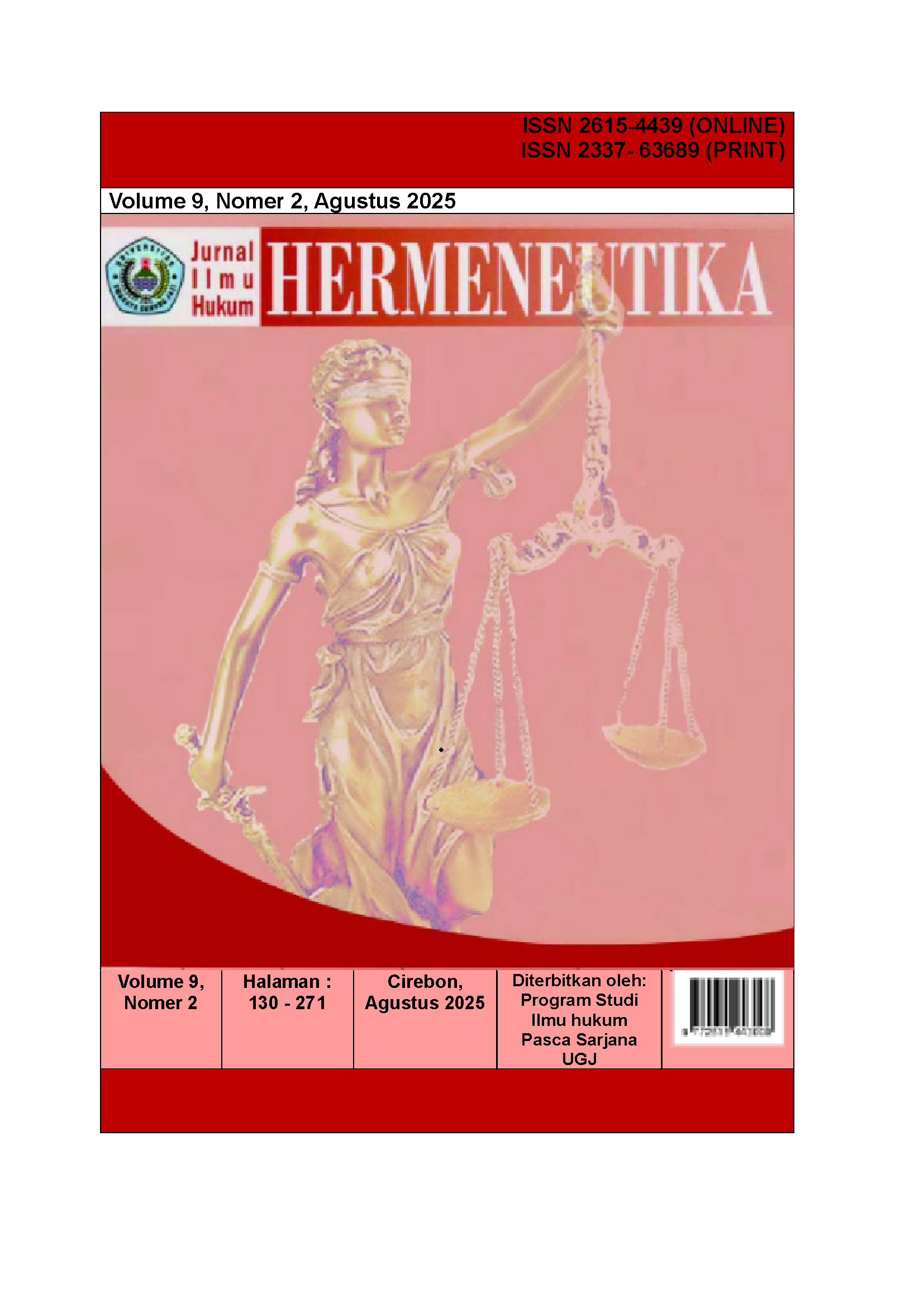POLICY IMPLEMENTATION LOCAL GOVERNMENT OF CIREBON DISTRICT FOR ORDER OF TRADITIONAL MARKETS (Study in Traditional Markets of Cirebon Regency)
DOI:
https://doi.org/10.33603/hermeneutika.v9i2.9916Kata Kunci:
Policies, Regional Regulations, Traditional MarketsAbstrak
Structuring and Controlling Traditional Markets in Cirebon Regency is regulated in Cirebon Regency Regional Regulation Number 7 of 2014 concerning Structuring Traditional Markets, Shopping Centres and Modern Stores. Aiming to regulate and organise traditional markets, the problem in this study is the implementation of the Cirebon Regency Regional Government policy for the regulation of Traditional Markets and the efforts made by the Cirebon Regency Regional Government in structuring and controlling Traditional Markets. This type of research uses qualitative methods, with an empirical juridical approach, looking at behaviour towards problems in traditional markets. Implementation of Local Government Policy regarding the structuring and management of traditional markets has been implemented but not maximised, there are still shortcomings regarding facilities that do not meet the standards for traders, cleanliness, comfort, the market still does not have an adequate drainage system and the location used as a place to sell is very disturbed by the density of the flow of transportation which results in pollution of merchandise and market security still needs to be improved.
Referensi
Reference
Aliyah, Istijabatul, (2017), Conceptual understanding of traditional markets in urban areas, Cakra Wisata, 18(2), 6.
Arnita, (2018), The Existence of Traditional Markets, RAK (Financial Accounting Research), 4 (2), 6.
Chriswia Dwi Rani Pinem et al., (2024), The Role of Public Sector Governance in Supporting the Effectiveness of Local Government Public Policy, National Conference of FISIP Partners, (21 ), 519–523.
Fauzi, Achmad, (2019), Regional Autonomy in the Framework of Realising Good Regional Governance, Legal Spectrum, 16(1), 119–136.
Guntoro, Mohamad, (2021), "Decentralisation and Regional Autonomy," Cendekia Jaya, 3(2), 1–9.
Laili Choirunnisa et al., (2023), The Role of Electronic-Based Government Systems (SPBE) in Improving the Accessibility of Public Services in Indonesia, Sosio Yustisia: Journal of Law and Social Change, (31 ), 71–95.
Muhaimin, Legal Research Methods, (2020) Mataram: Matarm University Press.
Mukti Fajar ND and Yulianto Achmad, (2010), Dualism of Normative Legal Research and Empirical Law, Yogyakarta: Student Library. Pambudi, Agung, (2006) Local Regulations and Investment Barriers, Jentera, 14(4), 35.
Riska Chyntia Dewi & Suparno,(2022) , Realising Good Governance Through Public Services, Journal of Administrative Media, (71 ), 78–90.
Santoso, M. Agus, (2011), The Role of the Regional House of Representatives in Executing the Supervisory Function, Ius Quia Iustum Law Journal, 18(4), 4–20.
Syahza, Almasdi, (2021), Research Methods, Pekanbaru.
Zulfirman, Roni, (2022), Implementation of Outdoor Learning Methods in Improving Student Learning Outcomes in Islamic Religious Education Subjects at MAN 1 Medan, Journal of Research, Education and Teaching, 3(2), 3.
Legislation and Regulations
Law Number 7 Year 2014 on Trade.
Presidential Regulation No. 112/2007 on the Arrangement and Development of Traditional Markets, Shopping Centres and Modern Stores.
Minister of Trade Regulation No. 70/M-DAG/PER/12/2013 on Guidelines for the Arrangement and Development of Traditional Markets, Shopping Centres, and Modern Stores.
Cirebon Regency Regional Regulation No. 7 of 2014 concerning Structuring Traditional Markets, Shopping Centres and Modern Stores.
Cirebon Regent Regulation 108/2015 on the Implementation Guidance of Cirebon Regency Regional Regulation Number 7/2014 on the Arrangement and Development of Traditional Markets, Shopping Centres and Modern Stores
Unduhan
Diterbitkan
Terbitan
Bagian
Citation Check
Lisensi
Hak Cipta (c) 2025 Nurfadilah, Endang Sutrisno, Sanusi

Artikel ini berlisensiCreative Commons Attribution-ShareAlike 4.0 International License.
The Authors submitting a manuscript do so on the understanding that if accepted for publication, copyright of the article shall be assigned to Jurnal HERMENUTIKA, Sekolah Pascasarjana Ilmu Hukum. Universitas Swadaya Gunung Jati as publisher of the journal. Copyright encompasses rights to reproduce and deliver the article in all form and media, including reprints, photographs, microfilms, and any other similar reproductions, as well as translations.
Jurnal HERMENEUTIKA, Universitas Swadaya Gunung Jati and the Editors make every effort to ensure that no wrong or misleading data, opinions or statements be published in the journal. In any way, the contents of the articles and advertisements published in Jurnal HERMENEUTIKA are the sole responsibility of their respective authors and advertisers.










